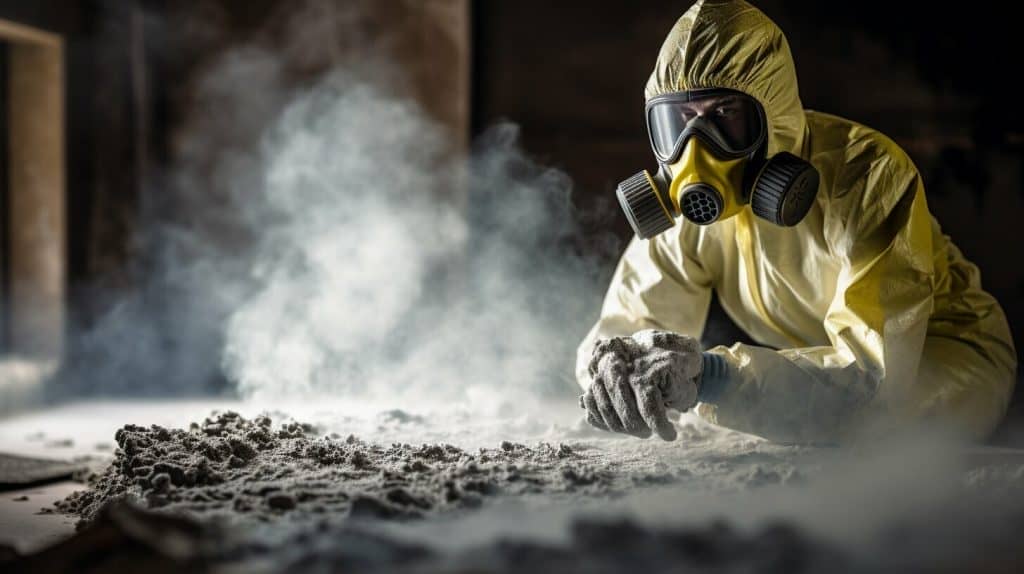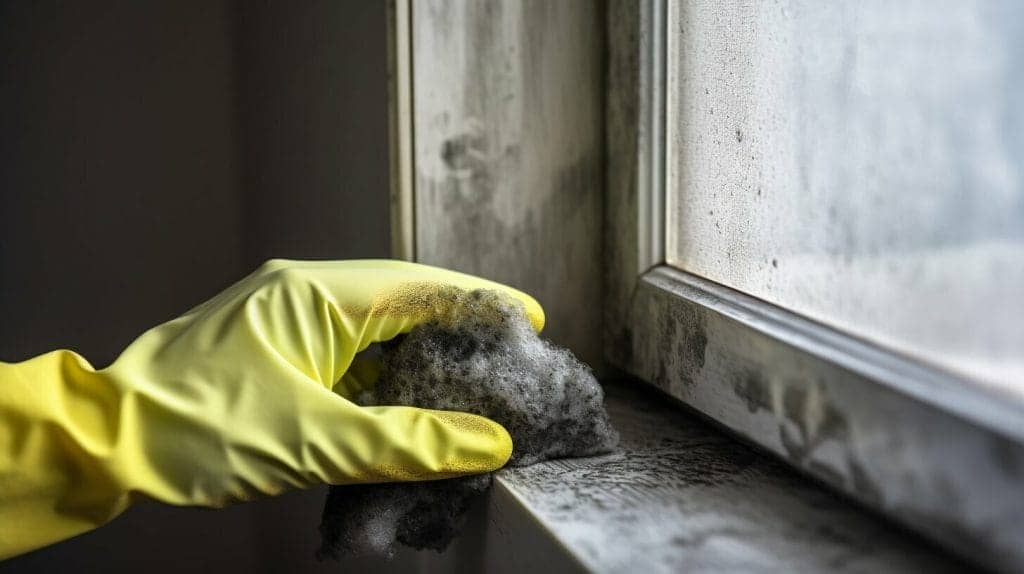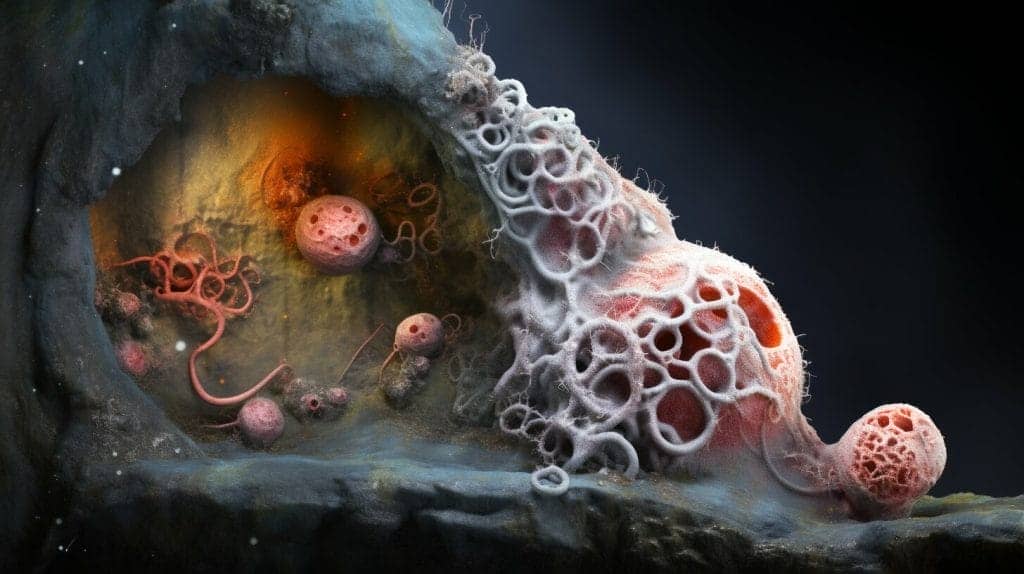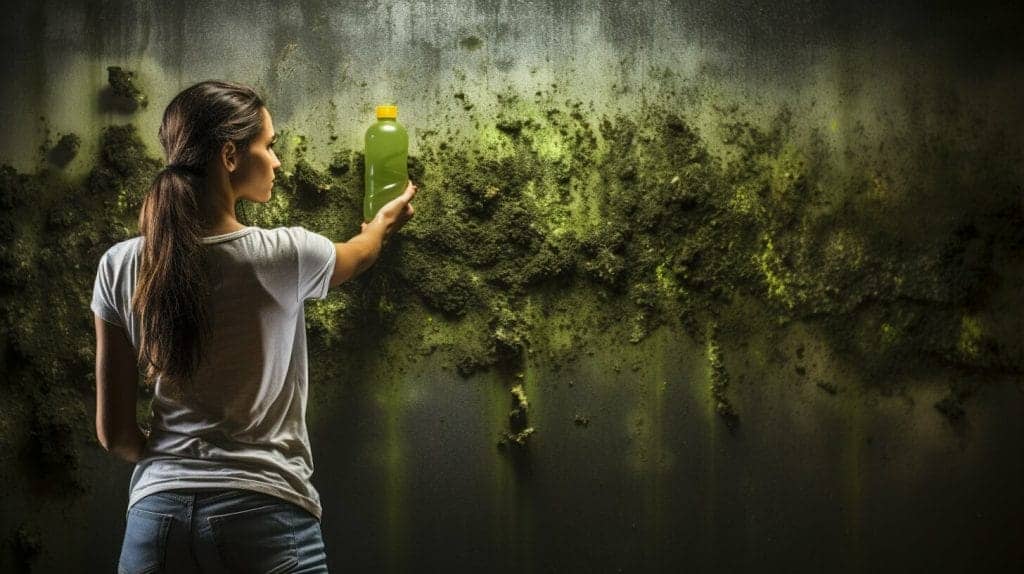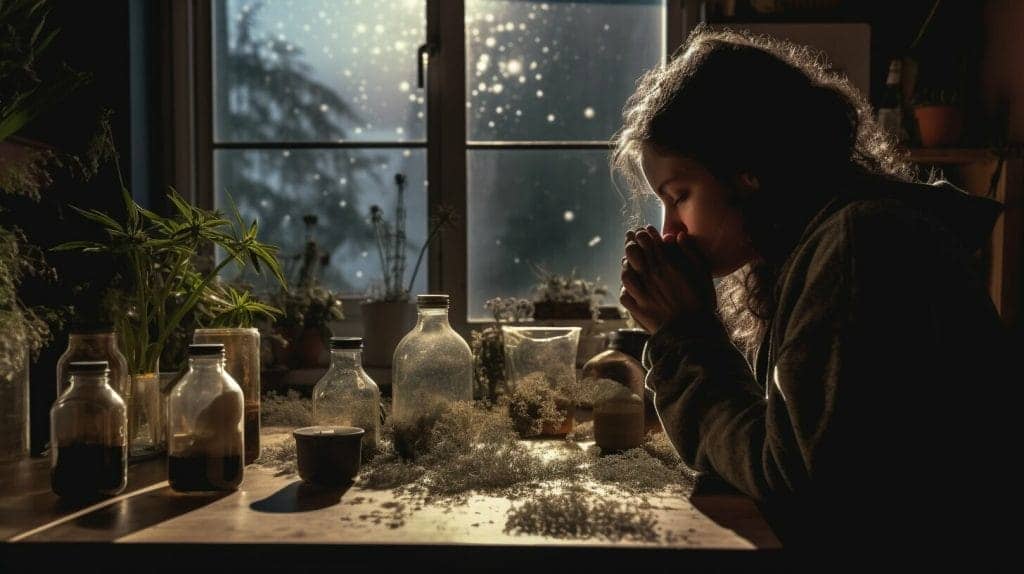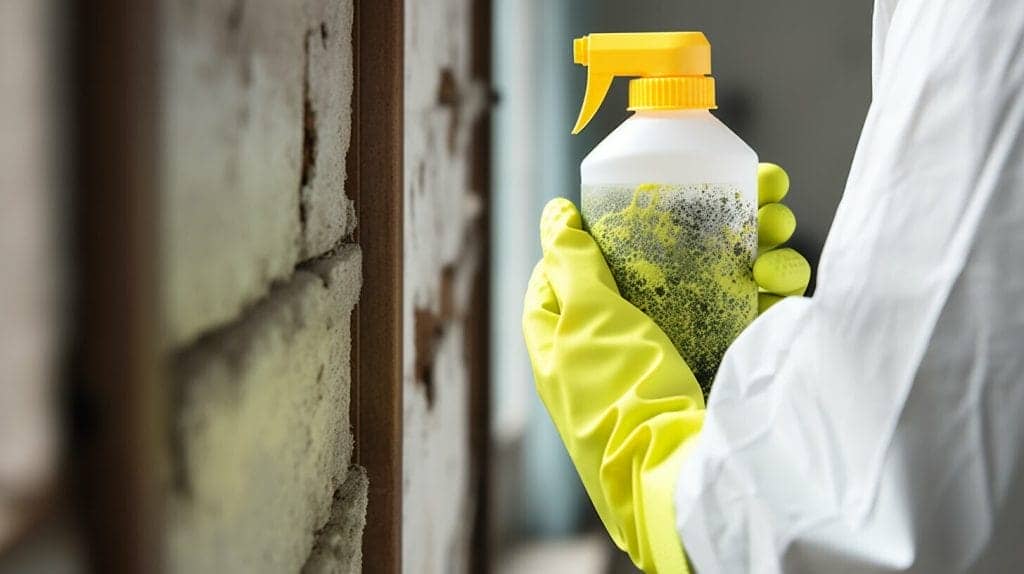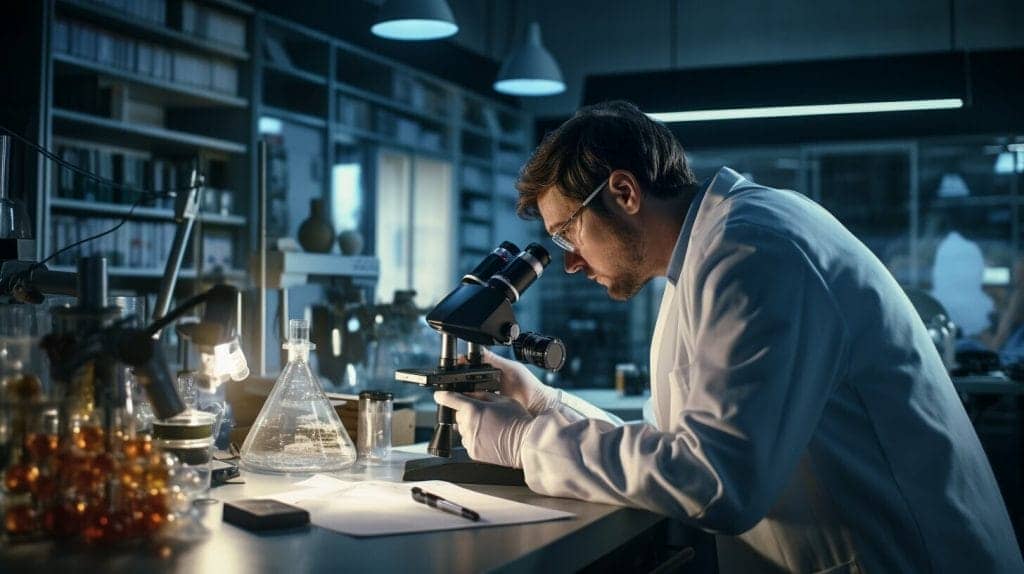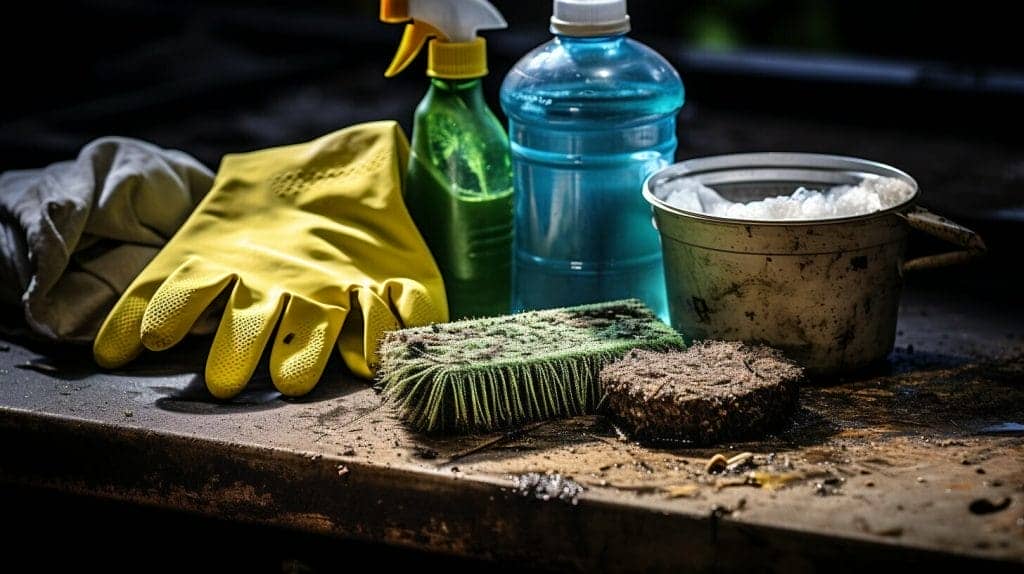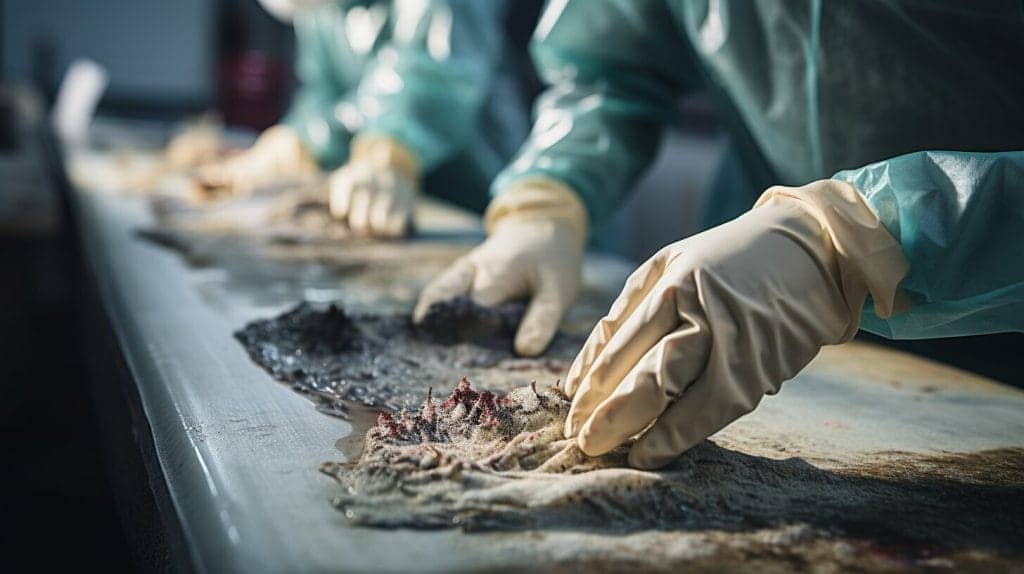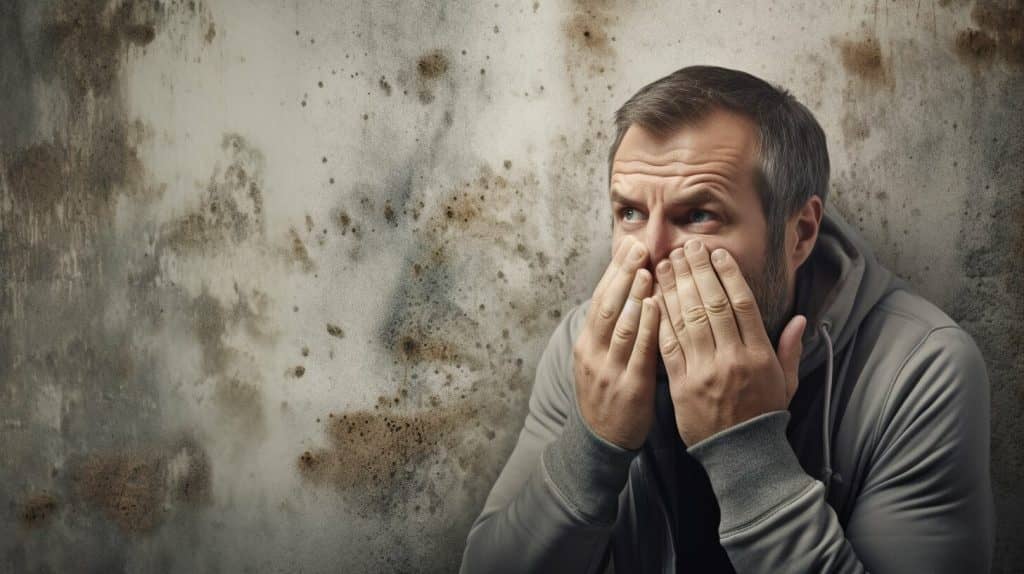Mold is a common problem in both residential and commercial settings, and its growth can lead to serious health issues. Fortunately, mold health specialists centers offer services to help protect your well-being from mold-related illnesses.
These centers focus on identifying and addressing mold concerns through testing, inspection, and remediation services. Mold health specialists centers play a critical role in ensuring a healthy indoor environment, and their expertise can help prevent long-term health problems caused by mold exposure.
Key Takeaways:
- Mold health specialists centers provide services to protect against mold-related illnesses.
- These centers offer testing, inspection, and remediation services to identify and address mold concerns.
- Preventing long-term health problems caused by mold exposure is a critical aspect of maintaining a healthy indoor environment.
Understanding Mold: Risks and Health Impacts
Mold is a common problem that can impact indoor air quality and pose a risk to human health. Mold spores are present in the air we breathe, and when they land on damp surfaces, they can start to grow and spread. Exposure to mold can trigger a range of health problems, especially in those with existing respiratory or immune system issues.
Common mold-related illnesses include:
- Allergies
- Asthma attacks
- Fungal infections
- Respiratory infections
- Exacerbation of existing conditions, such as COPD
For those with weakened immune systems, exposure to toxic mold strains, such as black mold, can be particularly dangerous. The severity of symptoms can vary depending on the extent of exposure and the individual’s overall health.
Indoor Air Quality and Mold
Mold growth can quickly impact indoor air quality, leading to a range of negative health effects. Poor ventilation and humidity levels create the ideal conditions for mold to thrive, making it important to address any water damage or moisture problems promptly to prevent mold growth.
Since many people spend most of their time indoors, maintaining good indoor air quality is crucial to prevent mold-related health issues. Regular inspections, adequate ventilation, and air purification systems can all help to mitigate the risk of mold growth and improve indoor air quality.
“Common mold-related illnesses include allergies, asthma attacks, fungal infections, respiratory infections, and exacerbation of existing conditions, such as COPD.”
If you suspect that you may have a mold problem in your home or workplace, it is essential to seek professional help. Mold health specialists centers can provide testing, inspection, and remediation services to address mold-related issues and ensure a healthy indoor environment.
The Significance of Mold Testing and Inspection
Mold testing and inspection play a critical role in identifying potential mold issues and ensuring a healthy indoor environment. Mold can grow anywhere with excess moisture, and it can be challenging to detect without professional assistance. Mold testing can identify the type of mold present and determine the level of contamination, while inspection can find the source of excess moisture and potential mold growth areas.
The process of mold testing involves collecting air or surface samples and sending them to a laboratory for analysis. The results will indicate the type of mold present and the level of contamination. This information is essential in determining the appropriate remediation steps and preventing future mold growth.
Regular mold inspections can also help maintain a healthy indoor environment by identifying areas with excess moisture and potential mold growth. Moisture control is the key to preventing mold growth, and inspections can help detect leaks, water damage, and other potential issues before they cause a mold problem.
Overall, mold testing and inspection are crucial in maintaining a healthy indoor environment and preventing mold-related illnesses. A professional mold health specialist can provide guidance on when and how to conduct mold testing and inspections and develop a remediation plan if necessary.
Finding the Right Mold Health Specialists Center
When it comes to finding the right mold health specialists center, it is essential to consider several factors. Mold-related issues require the expertise of professionals who understand the complexities of mold toxicity and its impact on health and indoor air quality.
One of the key factors to consider is the expertise of the mold experts working at the center. It is vital to choose a center with experienced and qualified professionals who have a deep understanding of mold detection, testing, and treatment. These professionals should be able to provide individualized treatment plans based on the specific needs of each patient.
Another aspect to consider is the range of services provided by the center. A comprehensive mold health specialists center should offer a range of services that includes mold testing, inspection, remediation, and prevention strategies. This allows patients to access all the necessary services under one roof and ensures seamless coordination of care.
It is also essential to find a center that focuses on patient-centered care and provides a safe and supportive environment for patients to receive treatment. Patients should feel comfortable discussing their concerns with the professionals and have access to the latest diagnostic tools and treatment options.
Finally, it is essential to consider the location of the mold health specialists center. Patients should choose a location that is convenient and accessible for them, making it easier to attend appointments and receive ongoing care.
By carefully considering these factors, patients can find the right mold health specialists center and receive the best possible care for their mold-related concerns.
Holistic Treatments at Oasis Medical Institute in Tijuana, MX
Oasis Medical Institute in Tijuana, Mexico offers a holistic approach to mold toxicity treatment. Dr. Francisco Contreras MD, a renowned oncologist, leads the Mold Toxicity Treatment Program, which integrates conventional and complementary therapies to address the complex nature of mold-related illnesses.
The holistic approach at Oasis Medical Institute focuses on boosting the body’s natural healing abilities and correcting underlying imbalances that contribute to mold toxicity. The program includes a thorough medical evaluation, detoxification therapies, nutritional guidance, and emotional support to address the physical and emotional impact of mold exposure.
The center’s team of experts utilizes advanced diagnostic tests, including mycotoxin testing, to identify the presence of mold toxins in the body and create personalized treatment plans based on each patient’s unique needs.
Integrated Therapies
The Mold Toxicity Treatment Program at Oasis Medical Institute incorporates a range of integrated therapies to address the various aspects of mold-related illnesses.
| Therapy | Description |
|---|---|
| Hyperthermia | Utilizes heat to increase blood flow and oxygenation, promoting natural detoxification |
| IV Therapy | Administers nutrients and antioxidants directly into the bloodstream to support the body’s healing process |
| Nutritional Therapy | Provides guidance on a nutrient-dense, anti-inflammatory diet to support immune function and detoxification |
| Mind-Body Therapies | Includes yoga, meditation, and counseling to address the emotional impact of mold-related illnesses |
The combination of these therapies provides a comprehensive approach to mold toxicity treatment, addressing both the physical and emotional aspects of the illness.
The Significance of Mold Testing and Inspection
Identifying potential mold issues is crucial in maintaining a healthy indoor environment. Mold testing and inspection play a significant role in this process. Mold testing is the process of taking air and surface samples to determine the type and quantity of mold present in the environment. Inspection involves a thorough evaluation of the property to identify areas of concern and potential mold growth.
Professional mold inspectors use specialized equipment and techniques to conduct mold inspections and tests. The results of these tests can help identify the source of mold growth and inform the appropriate course of action. Mold testing and inspection can detect hidden mold growth, which is not visible to the naked eye. Prompt detection can help prevent extensive mold damage and prevent the spread of mold spores.
| Mold Testing and Inspection Services | Benefits |
|---|---|
| Indoor Air Quality Testing | Detects potential mold issues and identifies areas of concern. |
| Surface Sampling | Determines the type and quantity of mold present in the environment. |
| Moisture Mapping | Identifies areas of excess moisture that may contribute to mold growth. |
Regular mold testing and inspection can help maintain a healthy indoor environment and prevent mold-related health issues. Homeowners and commercial property owners should schedule mold testing and inspection with mold health specialists centers regularly to address mold concerns promptly.
Understanding Mold Remediation and Removal Services
Mold remediation and removal services are essential for anyone dealing with mold-related issues. When mold is present, it can cause serious health problems and damage property. Whether it’s a residential or commercial property, hiring a professional mold removal service can ensure the safety and health of its occupants.
The Dangers of Black Mold
Black mold is a toxic mold strain that can cause severe health problems, including respiratory issues and neurological symptoms. Therefore, it is crucial to identify black mold as soon as possible and deal with it promptly.
Professional mold removal services have the knowledge and expertise to handle black mold safely and effectively. They can provide a thorough inspection of the property, identify the type and extent of the mold infestation, and develop a customized plan for remediation and removal.
Hiring Professional Mold Removal Services
Hiring a professional mold removal service is essential to ensure the safety and health of the occupants. When hiring a mold removal service, consider their experience, certifications, and licenses. A reputable company will have these documents readily available and be willing to show them to potential clients.
Professional companies typically follow a standard process for mold remediation and removal. This process involves identifying the source of the mold, containing the affected area, removing the mold using specialized equipment, and restoring the property to its pre-mold condition.
Professional mold removal services also use specialized equipment, such as HEPA vacuums and air scrubbers, to remove mold spores and improve indoor air quality. These tools can effectively remove mold and prevent it from spreading to other areas of the property.
Conclusion
Dealing with mold-related issues can be overwhelming, but hiring a professional mold remediation and removal service can ease the process. They have the experience, expertise, and tools to handle mold safely and effectively while ensuring the health and safety of the occupants. When dealing with mold, it’s important to act promptly and seek professional help to prevent further damage and health problems.
The Role of Indoor Air Quality in Mold Prevention
Indoor air quality is crucial in preventing mold growth and maintaining a healthy environment. Poor ventilation and trapped humidity can create the perfect breeding ground for mold, leading to potential health risks for occupants. Here are some key factors to consider:
Ventilation
Proper ventilation helps to reduce moisture, which is essential in preventing mold growth. Make sure to use exhaust fans in bathrooms, kitchens, and other high-moisture areas. It’s also important to open windows and doors to improve air flow and circulation.
Air Purification
Air purification systems can help to remove mold spores and other pollutants from the air and improve indoor air quality. Consider investing in a HEPA (high-efficiency particulate air) filtration system or a standalone air purifier to keep the air clean and healthy.
Regular Monitoring
Regularly monitoring indoor air quality can help to catch potential mold issues before they become a significant problem. DIY testing kits are available, but it’s recommended to hire a professional to conduct a thorough inspection of your home or workplace.
By implementing effective ventilation, air purification, and monitoring, you can significantly reduce the risk of mold growth and protect the health and well-being of occupants. Remember, prevention is key in maintaining a healthy indoor environment.
Signs and Symptoms of Mold-Related Illnesses
Mold exposure can cause a range of health issues, including respiratory problems, allergies, and skin irritation. It is important to recognize the signs and symptoms of mold-related illnesses to seek timely medical attention. Common symptoms of mold-related illnesses include:
- Coughing and sneezing
- Wheezing and shortness of breath
- Runny or stuffy nose
- Red, itchy, or watery eyes
- Skin rash or hives
- Fatigue and weakness
- Headache
If left untreated, mold-related illnesses can lead to more severe health problems. Toxic mold exposure, in particular, can cause more serious symptoms such as memory loss and neurological issues. If you suspect mold exposure or experience any of these symptoms, seek medical attention immediately.
Protecting Your Health: Tips for Avoiding Mold Exposure
Mold-related illnesses can have severe health impacts, making it crucial to take preventative measures. Here are some tips for avoiding mold exposure:
- Keep humidity levels low: Use air conditioners and dehumidifiers to maintain indoor humidity below 60%.
- Address water leaks promptly: Repair any leaks in pipes, roofs, or walls to prevent moisture buildup.
- Improve ventilation: Use exhaust fans in kitchens and bathrooms to remove excess humidity. Keep doors and windows open when possible to improve airflow.
- Regularly inspect problem areas: Check high-risk areas such as basements, attics, and crawl spaces for any signs of mold growth.
- Clean visible mold immediately: Use a solution of water and detergent to clean mold on non-porous materials. Discard any porous materials that have mold growth.
- Wear protective clothing: Use gloves, masks, and goggles when cleaning or handling mold.
By implementing these tips, you can reduce the risk of mold-related illnesses and protect your well-being.
The Importance of Regular Maintenance to Prevent Mold Growth
To prevent mold growth in residential and commercial areas, regular maintenance is crucial. The key to preventing mold is to eliminate moisture through proper ventilation and effectively managing water leaks and spills. Routine maintenance can help identify potential sources of moisture, reducing the risk of mold growth.
Regular inspection of building elements like roofs, walls, and windows can help to detect leaks and water damage early on. The use of moisture meters can also help to identify hidden moisture that can lead to mold growth if left unaddressed. Keeping indoor humidity levels below 60% can help in deterring mold growth.
Proper cleaning can also help to prevent mold growth. Surfaces should be cleaned and dried thoroughly to prevent moisture buildup. Carpeting, upholstery, and household fabrics should be cleaned and maintained with dry methods or with low moisture. Chemical products used for cleaning should not contain harmful VOCs that can contribute to indoor air pollution.
It is important to address any mold concerns immediately to prevent it from spreading and causing harm. This can be achieved through professional mold remediation and removal services. A reliable mold health specialists center can provide the necessary expertise to ensure safe and effective mold removal, restoring the environment to a healthy state.
Understanding Black Mold: Myths and Facts
Black mold, also known as Stachybotrys chartarum, is a type of toxic mold that can cause serious health problems if not addressed properly. There are many misconceptions surrounding black mold, which can lead to confusion and misinformation. In this section, we will debunk some common myths and provide accurate information about the dangers and characteristics of black mold.
Myth: All Black Mold is Dangerous
Fact: Not all black molds are toxic. While Stachybotrys chartarum is a highly toxic black mold, not all black molds produce mycotoxins, the harmful substances that can cause health problems.
Myth: You Can Easily Identify Black Mold by Its Color
Fact: The color of mold does not determine its type or toxicity. Black mold can appear in different shades, including dark green and grayish-black. The best way to identify black mold is through professional testing and inspection.
Myth: Bleach is an Effective Tool for Removing Black Mold
Fact: Bleach is not an effective tool for removing black mold. In fact, using bleach can worsen the problem by spreading the spores and causing them to release more mycotoxins into the air. To effectively remove black mold, it is important to hire professionals who have the appropriate tools and equipment for safe and effective removal.
Myth: Black Mold Only Grows in Wet or Damp Environments
Fact: While black mold thrives in moist environments, it can also grow in dry areas and can often be found in places with poor ventilation, such as crawl spaces and attics. It is important to regularly inspect these spaces and address any mold concerns promptly.
Myth: Black Mold Only Affects Those with Allergies or Asthma
Fact: Black mold exposure can cause serious health problems, regardless of an individual’s allergies or asthma. Symptoms of black mold exposure can include respiratory problems, headaches, fatigue, and skin rashes. It is important to seek professional help if you suspect black mold exposure.
By understanding the myths and facts about black mold, you can take proactive measures to prevent its growth and protect your health. It is important to seek the advice and services of mold health specialists centers for safe and effective mold remediation and removal.
Identifying High-Risk Areas for Mold Growth
Mold can grow in any environment with excessive moisture and humidity levels. However, there are certain areas in residential and commercial settings that are particularly susceptible to mold growth. Identifying these high-risk areas can help prevent mold growth and ensure a healthy indoor environment.
Here are some common high-risk areas for mold growth:
| Area | Reason for High Risk |
|---|---|
| Bathrooms | Bathrooms are often humid and wet, providing an ideal environment for mold growth. Improper ventilation can exacerbate the problem. |
| Kitchens | Kitchens can have high humidity levels, especially if cooking involves boiling or steaming. Spills and leaks can also contribute to moisture buildup. |
| Basements | Basements are often damp and poorly ventilated, making them a prime location for mold growth. Water leaks and flooding can also contribute to moisture buildup. |
| Crawl Spaces | Crawl spaces are often poorly ventilated and can accumulate moisture, making them susceptible to mold growth. Inadequate insulation can exacerbate the problem. |
High humidity levels, poor ventilation, and water leaks or damage are the primary drivers of mold growth. Regular inspection and maintenance of these high-risk areas can help prevent the development of mold and ensure a healthy indoor environment.
Frequently Asked Questions About Mold Health Specialists Centers
Are mold-related illnesses serious?
Yes, mold-related illnesses can cause a range of health problems, including respiratory issues, fatigue, headaches, and skin irritation. In severe cases, exposure to toxic mold can lead to neurological damage and even death. It is essential to seek professional help if you suspect mold growth in your home or workplace.
What services do mold health specialists centers offer?
Mold health specialists centers provide a range of services, from mold testing and inspection to remediation and removal. They also offer mold toxicity treatment programs, holistic therapies, and consultations on mold prevention strategies. The goal of these centers is to help individuals maintain a healthy indoor environment and prevent mold-related illnesses.
Do mold health specialists centers use eco-friendly methods?
Many mold health specialists centers use eco-friendly methods for mold remediation and removal. These methods prioritize the safety of individuals and the environment and can include the use of natural cleaning agents, air purification systems, and sustainable building materials. If you have concerns about the methods used by a mold health specialists center, be sure to ask about their approach to eco-friendliness.
How do I know if I have black mold in my home?
Black mold, also known as Stachybotrys chartarum, can be identified by its dark green or black color and slimy texture. It often appears in areas with high humidity and moisture, such as bathrooms, kitchens, and basements. If you suspect black mold in your home, it is essential to seek professional help for safe and effective removal.
Are mold health specialists centers expensive?
The cost of mold health specialists centers can vary depending on the services provided and the location of the center. However, investing in professional mold prevention and remediation can save you money in the long run by reducing the risk of costly repairs and medical bills associated with mold-related illnesses. Some insurance policies may also offer coverage for mold-related services, so be sure to check with your provider.
Can I prevent mold growth on my own?
While it is possible to take steps to prevent mold growth on your own, it is always recommended to seek professional help for mold prevention and remediation. Mold health specialists centers have the expertise and equipment to identify and address potential mold issues effectively. However, you can take proactive measures to minimize the risk of mold growth by maintaining proper ventilation, controlling moisture levels, and regularly cleaning and inspecting your home or workplace.
The Significance of Mold Health Specialists Centers in Safeguarding Your Well-Being
Mold health specialists centers offer a wide range of services aimed at safeguarding your well-being from mold-related illnesses. These centers provide holistic treatment options and practical strategies for mold prevention, making them an essential resource for maintaining a healthy indoor environment.
Understanding the health risks associated with mold exposure is crucial in preventing mold-related illnesses. Indoor air quality can be significantly impacted by mold growth, leading to respiratory problems, allergies, and other health issues. Therefore, addressing mold concerns promptly is critical in maintaining good health.
Services Offered by Mold Health Specialists Centers
Mold health specialists centers offer various services, including mold testing and inspection, remediation and removal, and holistic treatment programs. These centers employ mold experts who can identify potential mold issues and provide effective solutions to minimize the risk of mold-related illnesses.
Importance of Mold Testing and Inspection
Mold testing and inspection are crucial in identifying potential mold issues before they become a significant health concern. These processes involve thorough evaluations of indoor environments to detect mold growth and determine the best course of action for mold prevention and remediation.
Finding the Right Mold Health Specialists Center
Choosing the right mold health specialists center is critical in receiving effective treatment and quality care. When selecting a center, one should consider the expertise of the mold experts and the range of services offered. It is also essential to research reviews and ratings of the center to ensure it meets the individual’s needs.
Holistic Treatments at Oasis Medical Institute in Tijuana, MX
Oasis Medical Institute in Tijuana, Mexico, offers an integrated approach to mold toxicity treatment, combining conventional and alternative therapies. Dr. Francisco Contreras MD leads the team of experts, providing holistic Mold Toxicity treatment programs that promote comprehensive healing.
Mold Prevention Strategies for a Healthy Environment
Practical mold prevention strategies can significantly reduce the risk of mold growth and related illnesses. Proper ventilation, moisture control, and regular cleaning are essential in maintaining a healthy indoor environment. Through routine inspections and proactive measures, one can identify potential mold issues and take action to prevent mold growth.
Understanding Mold Remediation and Removal Services
Mold remediation and removal services are critical in addressing mold concerns safely and effectively. Black mold, in particular, can pose significant health risks and should be handled by professionals trained in mold removal. Effective mold removal services can restore indoor air quality and promote a healthy living environment.
Mold-Related Illnesses: Signs and Symptoms
Recognizing the signs and symptoms of mold-related illnesses is crucial in seeking professional help for diagnosis and treatment. These symptoms can include respiratory issues, skin irritation, and other health problems. It is essential to address these symptoms promptly to prevent further health complications.
Protecting Your Health: Tips for Avoiding Mold Exposure
Effective mold prevention strategies can significantly reduce the risk of mold-related illnesses. Personal hygiene, moisture control, and regular inspections are critical in avoiding mold exposure and promoting good health. These proactive measures can safeguard your well-being from the harmful effects of mold exposure.
Conclusion
Mold health specialists centers offer a range of services aimed at safeguarding your well-being from the harmful impacts of mold exposure. Through effective mold prevention strategies, regular maintenance, and professional mold removal services, one can maintain a healthy indoor environment and prevent mold-related illnesses. It is essential to take proactive steps in mold prevention and address any concerns promptly to promote comprehensive healing.
Frequently Asked Questions About Mold Health Specialists Centers
Q: What services do mold health specialists centers offer?
A: Mold health specialists centers offer a range of services related to mold-related illnesses. These can include mold testing and inspection, mold remediation and removal, holistic treatments, and guidance on mold prevention strategies.
Q: How do mold health specialists centers contribute to maintaining a healthy indoor environment?
A: Mold health specialists centers play a crucial role in maintaining a healthy indoor environment by identifying potential mold issues through testing and inspection. They also offer remediation and removal services to ensure the safe and effective elimination of mold. Additionally, these centers can provide holistic treatments and guidance on mold prevention strategies to reduce the risk of mold-related illnesses.
Q: What factors should I consider when choosing a mold health specialists center?
A: When choosing a mold health specialists center, it is essential to consider the expertise of mold experts and professionals working at the center. Look for certifications and qualifications that demonstrate their knowledge and experience in dealing with mold-related issues. Additionally, consider the range of services provided by the center to ensure they align with your specific needs.
Q: Are mold health specialists centers expensive?
A: The cost of services offered by mold health specialists centers can vary depending on various factors such as the extent of the mold problem, the services required, and the location of the center. It is recommended to contact the centers directly to inquire about their pricing structure and discuss any insurance coverage that may apply.
Q: Why is it important to seek professional help for mold-related concerns?
A: Seeking professional help for mold-related concerns is crucial because mold can pose significant health risks. Professionals at mold health specialists centers have the expertise and knowledge to properly identify and address mold issues. They can ensure the safe removal of mold and provide guidance on preventing future mold growth, ultimately safeguarding your well-being.
Dr. Francisco Contreras, MD is a renowned integrative medical physician with over 20 years of dedicated experience in the field of integrative medicine. As the Medical Director of the Oasis of Hope Hospital in Tijuana, Mexico, he has pioneered innovative treatments and integrative approaches that have been recognized globally for the treatment of cancer, Lyme Disease, Mold Toxicity, and chronic disease using alternative treatment modalities. Dr. Contreras holds a medical degree from the Autonomous University of Mexico in Toluca, and speciality in surgical oncology from the University of Vienna in Austria.
Under his visionary leadership, the Oasis of Hope Hospital has emerged as a leading institution, renowned for its innovative treatments and patient-centric approach for treating cancer, Lyme Disease, Mold Toxicity, Long-Haul COVID, and chronic disease. The hospital, under Dr. Contreras's guidance, has successfully treated thousands of patients, many of whom traveled from different parts of the world, seeking the unique and compassionate care the institution offers.
Dr. Contreras has contributed to numerous research papers, articles, and medical journals, solidifying his expertise in the realm of integrative medicine. His commitment to patient care and evidence-based treatments has earned him a reputation for trustworthiness and excellence. Dr. Contreras is frequently invited to speak at international conferences and has been featured on CNN, WMAR2 News, KGUN9 News, Tyent USA, and various others for his groundbreaking work. His dedication to the medical community and his patients is unwavering, making him a leading authority in the field.
Contreras has authored and co-authored several books concerning integrative therapy, cancer, Lyme Disease and heart disease prevention and chronic illness, including "The Art Science of Undermining Cancer", "The Art & Science of Undermining Cancer: Strategies to Slow, Control, Reverse", "Look Younger, Live Longer: 10 Steps to Reverse Aging and Live a Vibrant Life", "The Coming Cancer Cure Your Guide to effective alternative, conventional and integrative therapies", "Hope Medicine & Healing", "Health in the 21st Century: Will Doctors Survive?", "Healthy Heart: An alternative guide to a healthy heart", “The Hope of Living Cancer Free”, “Hope Of Living Long And Well: 10 Steps to look younger, feel better, live longer” “Fighting Cancer 20 Different Ways”, "50 Critical Cancer Answers: Your Personal Battle Plan for Beating Cancer", "To Beat . . . Or Not to Beat?", and “Dismantling Cancer.”

